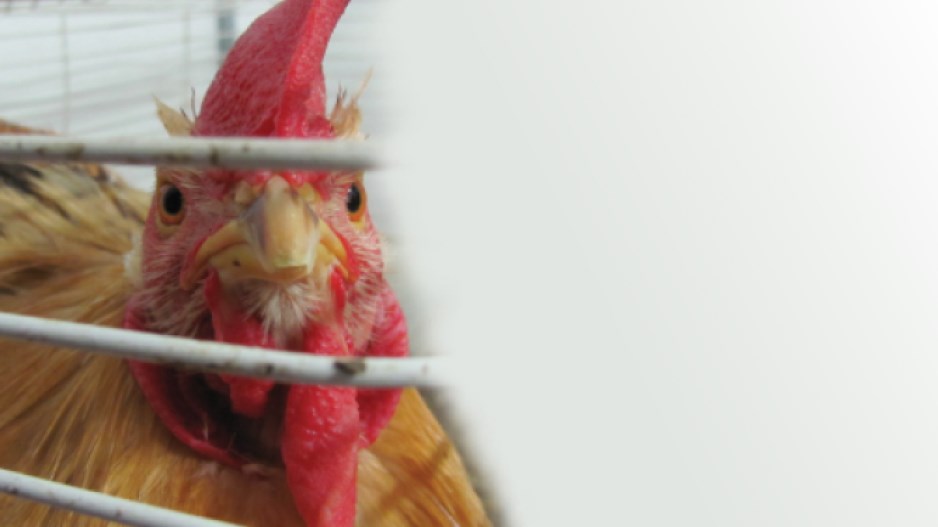Forced price cuts to appease retailers could threaten the economic viability of the organic chicken business in B.C., producers say.
Organic chicken production has surged in B.C. since 2005 when it became part of the regulated supply managed by the BC Chicken Marketing Board.
The province's four licensed organic chicken growers last year sold 2.1 million kilograms of birds, 1.4% of the chicken produced in B.C., up from just 129,396 kilograms in 2005.
But a 2013 survey found that prices were too high for buyers, prompting the board to designate organic chicken as a mainstream product beginning September 7.
That eliminates the base price – linked to production costs – all other growers receive.
“Organic is the only one now, in all their different chicken variations, that has no price,” said Corry Spitters, a veteran of the poultry industry who operates Oranya Farms in Aldergrove with his son Jordan. “If this thing doesn't change, it could easily bankrupt us in a very, very short time.”
The farm is fighting the marketing board's decision. It wants the BC Farm Industry Review Board (FIRB) to order a halt to the change until the specialty poultry sector is reviewed – something the board suggested in 2009. But the review never happened.
The fight shows how important regulated marketing is to the livelihood of B.C. farmers.
Spitters bought Oranya last fall from Bradner Farms of Abbotsford, and applied his expertise to boost production to 30,000 birds a week – a harvest worth $18 million a year.
But his investment is now in jeopardy.
Spitters said the 30% premium he paid for the specialty quota previously required to produce organic chicken will be wiped out, shaving $1.5 million off the farm's equity and decreasing borrowing power.
Conversely, conventional producer-processors such as Vancouver-based Sunrise Farms Ltd. will be able to enter organic production without the added cost Spitters and B.C.'s three other quota-holding organic producers faced.
Moreover, organic production costs are two and a half times higher than what conventional pricing supports – with the most recent base pricing for organic chicken at $4.24 per kilogram of live weight, versus $1.70 for conventional birds. By reducing base pricing, the new structure will force organic growers to consider offers from processors that don't reflect production costs.
But prices need to drop if growers want to increase sales, said Cheryl Davie, the chicken board's manager of strategic initiatives and analysis.
“The organic sector has changed, especially with Costco getting into the market,” she said. “We were starting to get organic chicken from Ontario coming into B.C. because it was cheaper.”
To compete with cheaper product from out of province and respond to consumer resistance to high prices for local chicken, the marketing board reclassified organic chicken as a mainstream product and let growers negotiate premiums directly with processors.
“We're in transition now from a small niche market to more of a commodity,” Davie said.
However, the Canadian Organic Trade Association believes organic poultry producers in B.C. need more support, not less.
“There is a clear market opportunity for organic meat and poultry; however, this sector arguably faces the greatest challenges of all organic products,” it concluded in a report last year. “A strategy to expand the production and market opportunities for organic meat and poultry is required at both the provincial and national level.”
A lower pricing structure isn't it, said Dave Reid, a Langley grower whose father, Thomas Reid, battled the marketing board for years to have organic chicken recognized as a product distinct from conventional chicken.
“It took us years of fighting to get that base price, because our costs are so much higher,” he said. “I think that [retail sales] do need to increase, but the prices they're asking for [are] not sustainable.”
Spitters was a director of the marketing board during the battles with Reid, and the irony that he's now fighting the board over its regulation of organic production isn't lost on him.
“There was no provision at that time – 1999, 2000 – there was no provision to make them unique,” he said. “Now we have a provision. Why aren't we continuing to use it? It flies in the face of everything that FIRB did between 2003 and 2005.”




